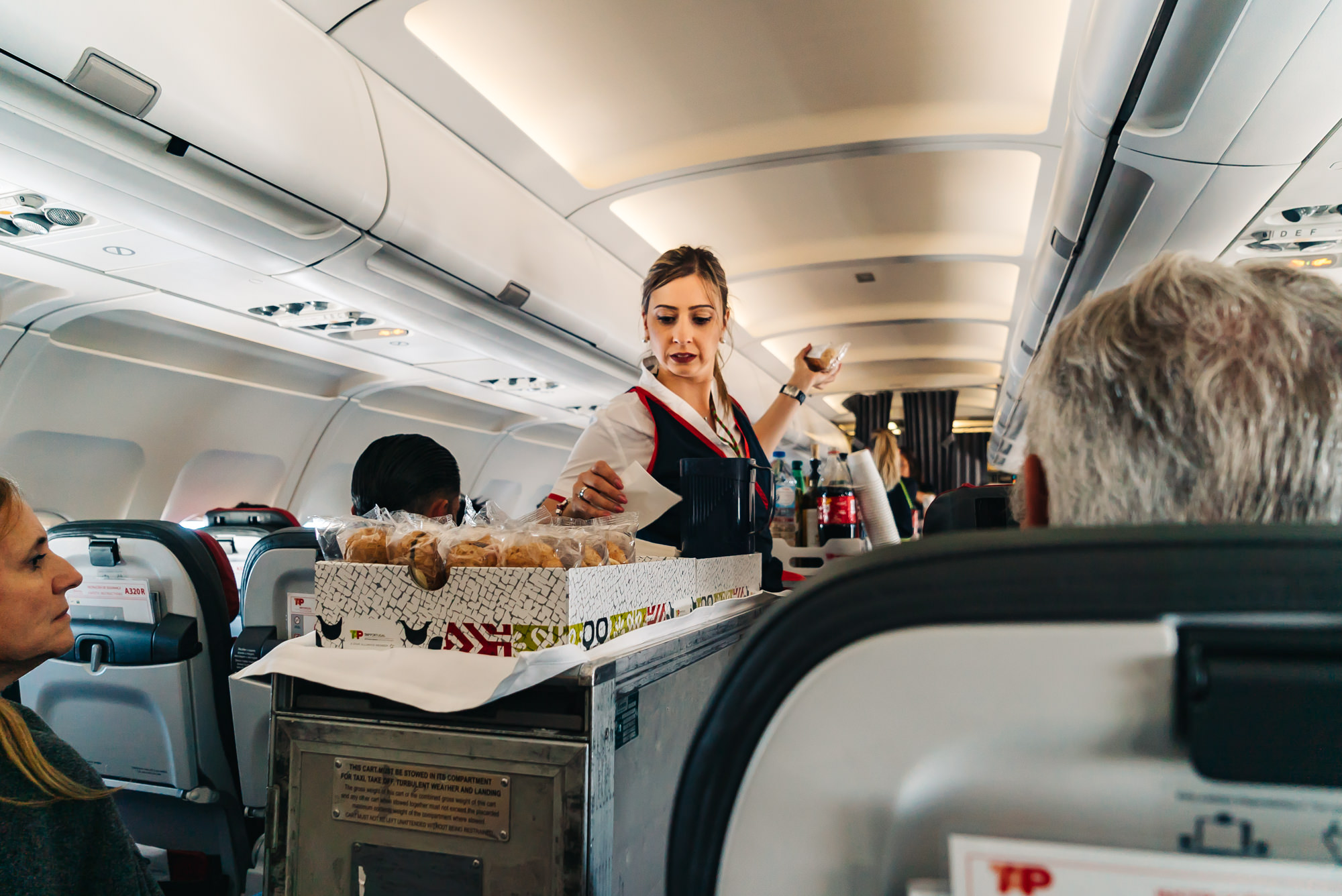Access selected deals available with budget and full-service airlines
Lock any airfare that sounds great. You don’t lose anything if you cancel it
Call us anytime for any assistance. We do not go into hibernation
Your personal and financial information stays secure with us
TAP Air Portugal, officially Transportes Aéreos Portugueses, is Portugal’s flag carrier, headquartered in Lisbon. Founded in 1945, it operates from its primary hub at Lisbon Humberto Delgado Airport (LIS) and a secondary hub at Porto’s Francisco de Sá Carneiro Airport (OPO). As a Star Alliance member since 2005, TAP connects over 90 destinations in 37 countries across Europe, Africa, North America, and South America, with a strong focus on Brazil. Known for modern Airbus aircraft, a unique stopover program, and Portuguese hospitality, TAP carries approximately 16 million passengers annually. Despite praise for its competitive fares and inflight experience, the airline faces criticism for customer service, strict baggage policies, and frequent delays. Government-owned since its 2020 renationalization, TAP is navigating a restructuring plan with privatization talks ongoing as of 2025.

TAP Air Portugal was founded on March 14, 1945, as a state-owned division of Portugal’s Civil Aviation Department under the name Transportes Aéreos Portugueses. Commercial operations began on September 19, 1946, with an inaugural Lisbon–Madrid flight using a Douglas DC-3, carrying 11 passengers. On December 31, 1946, TAP launched its Linha Aérea Imperial, a 15-day, 24,450 km colonial route to Luanda, Angola, and Lourenço Marques (now Maputo), Mozambique, the longest twin-engine airliner service at the time.
In 1953, TAP was privatized for the first time, becoming a public limited company, and expanded to Tangier and Casablanca. By 1955, Lockheed Super Constellations reduced flight times to African destinations and enabled a pioneering transatlantic trip to Rio de Janeiro, carrying Portuguese aviator Carlos Viegas Gago Coutinho. In 1967, TAP became Europe’s first all-jet airline. Renamed TAP Air Portugal in 1979, it modernized with Boeing 707s and 747s, later transitioning to Lockheed L-1011 TriStars and Airbus A310s in the 1980s. By the 1990s, TAP replaced its Boeing 727s and 737s with Airbus A319s, A320s, A321s, and A340s, becoming an Airbus-exclusive operator.
The 2005 Star Alliance membership enhanced global connectivity, and in 2008, TAP migrated to Amadeus’ Altéa reservation system, replacing its Tapmatic system from 1972. New routes to Moscow, Warsaw, Helsinki (2009), Marrakesh, Miami, and Porto Alegre (2010–2011) underscored its growth, particularly in Africa, where passenger numbers rose 129% from 2001 to 2010. In 2015, a consortium led by JetBlue founder David Neeleman acquired 61% of TAP, but financial losses and the pandemic prompted renationalization in 2020. A 2021 EU-approved restructuring plan included €3.2 billion in state aid, fleet reduction, and staff cuts. As of 2025, privatization talks with Lufthansa, Air France-KLM, and IAG are ongoing, with the Portuguese government targeting completion by 2026.
TAP operates a fleet of 93 Airbus aircraft (as of June 2025), including A319, A320ceo/neo, A321ceo/neo, A321LR, A330-200, and A330-900neo, with an average age of 8.2 years. The A330-900neo, introduced in 2018 as the world’s first, features the Airspace cabin with 34 Business Class flat-bed seats, 96 Premium Economy, and 168 Economy seats. The A321LR, a narrow-body for transatlantic routes, supports TAP’s U.S. expansion. TAP Express, a subsidiary, operates 21 Embraer E190/E195 and ATR 72-600s for short-haul routes.
Sustainability is central to TAP’s strategy, targeting a 50% CO2 emissions reduction by 2030 and carbon neutrality by 2050. In 2016, TAP was the first European airline to install sharklet wingtips, reducing emissions by 4%. In 2022, it operated Portugal’s first sustainable aviation fuel (SAF) flight. Fuel-efficient A320neo and A330neo aircraft, single-engine taxiing, and waste reduction further its eco-friendly goals.